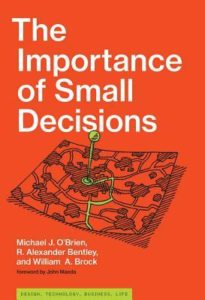Highlights & Annotations
Reading rec: “Mapping Collective Behaviour in the Big-Data Era” - Behavioural and Brain Sciences (xvii)
Nonhuman systems of domestication (7) // biomimicry in a way?
“The wisdom-of-crowds effect is lost if agents are not thinking independently and are being influenced by their neighbours’ estimates” (10)
“Clothes are necessary, but attractiveness is a moving target that changes with time” (18) → interesting point re: fashion
“Modern fashion are subject to drift – the colour, material, and style are rarely driven by selection. At one level, we are ‘selecting’ – making decisions about – what to wear, but the choices from which we select have been pre-chosen by clothing designers and market researchers.” (18)
“Small differences...can have real fitness effects”
“Individual decisions, when aggregated, can have major evolutionary implications” (21)
“Life is not a series of random events. Rather, it’s a continuum of contingencies, meaning that each step along the way is contingent on what came before. Can we always see these steps? No, of course not. But philosopher Dan Dennett makes an excellent point with respect to the power of Darwin’s theory of natural selection, noting that its power lies not in its ability to prove exactly how history was but in its power to show how it could have been, given a certain set of conditions.” (35-6)
“Copying is itself a set of competing strategies in that you might preferentially copy someone based on your perception of his or her skill level. Maybe you copy those who appear better at something than you are, or those who themselves appear to be good social learners, or those who are successful. Or maybe you base your decision on social criteria, so that you copy the majority of people you’re around, or kin or friends, or older individuals. The various factors that can affect your choice of whom to copy are often referred to as ‘biases’ – unique evolutionary forces for the selective retention of cultural variants. That’s why the term ‘biased learning’ is commonly used as a synonym for certain social-learning strategies.” (46)
Exploration-exploitation strategy - constantly try new things until you find something that works and then milk that opportunity as much as you can before moving along again
- Explore faster and faster to stay competitive in a ‘dancing economy’ (64)
Map on p.72 - trade-off = simplifying assumptions you must make
“Ideal free-distribution” - go for the best place first, then go to the next best thing available if your initial choice is not available (75)
“If all you do is copy others, you can become stuck on a suboptimal peak.” (77)
“Bayesian thinking” - continually update prior info using current environmental cues → // adaptation? Adapting quickly? (84)
“Weak feedback loops do just the opposite, leading to the dreaded Red Queen effect.” (84) → running as fast as you can to even keep up; must run double-time to get somewhere else
“In economies replete with online communication and a constant barrage of information, crucial human decisions-making is becoming more herd-like” (100) → // people communicating in headlines and missing nuances
“Doing some critical thinking about information is more time-consuming and costly than taking the shortcut of just copying your peers” (109)
“False rumors spread farther and faster and tended to be more surprising and novel, as well as more disgusting and scary, than true information” (110)
“Believing false news might make us feel scared, but in some ways this ‘scariness’ has been building for a long time. Fear-related words, for example, have been on the rise in English-language books since at least the 1980s, unlike most other emotions, which have decreased since the early twentieth century. Why? Perhaps it has something to do with the dissolution of kin groups and proliferation of decisions that people have never encountered before, from the monumental to the mundane. This must be upsetting for a species that evolved living in small groups of well-known kin, making decisions according to adaptive cultural recipes that had been handed down through countless generations.” (110).
